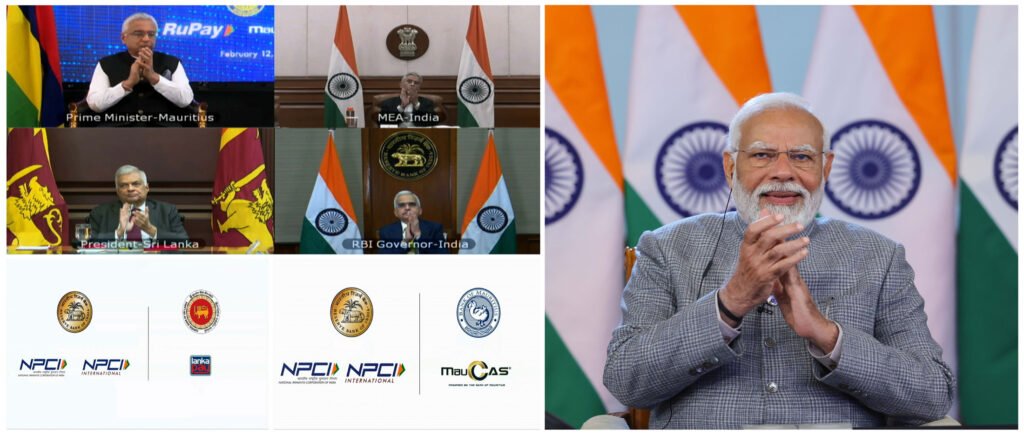Launch of UPI and Rupay Card in Sri Lanka and Mauritius
The financial landscape in South Asia witnessed a significant transformation with the recent launch of the Unified Payments Interface (UPI) and Rupay Card services in Sri Lanka and Mauritius. This strategic move aims to foster economic ties and simplify cross-border transactions between India and these two nations. In this article, we will delve into the details of this development and explore its implications for students preparing for government exams, including positions in teaching, policing, banking, railways, defense, and civil services such as PSCS to IAS.
The introduction of UPI and Rupay Card services in Sri Lanka and Mauritius marks a pivotal moment in the region’s financial connectivity. This initiative is part of India’s broader efforts to strengthen economic partnerships with its neighboring countries.
Key Features of UPI and Rupay Card in Sri Lanka and Mauritius:
The UPI and Rupay Card services bring with them a range of features that will significantly impact the financial landscape. From seamless cross-border transactions to enhanced digital payments, these services are poised to revolutionize the way individuals and businesses conduct financial transactions.
Implications for Government Exam Aspirants:
For students preparing for government exams, especially those targeting positions in banking and civil services, understanding the intricacies of international financial collaborations is crucial. Questions related to such developments are likely to be included in examinations, making it imperative for aspirants to stay updated on current affairs.
Challenges and Opportunities:
While the launch of UPI and Rupay Card in Sri Lanka and Mauritius presents numerous opportunities, it also comes with its set of challenges. Understanding these nuances is essential for aspirants aiming to excel in exams that assess their awareness of current affairs.
Why this News is Important
The launch of UPI and Rupay Card services in Sri Lanka and Mauritius holds immense significance, especially in the context of India’s diplomatic and economic endeavors in the South Asian region.
Enhanced Regional Financial Connectivity:
This development strengthens the economic ties between India, Sri Lanka, and Mauritius, fostering greater financial connectivity and collaboration.
Digital Transformation in Finance:
The introduction of UPI and Rupay Card services reflects the ongoing digital transformation in the financial sector, showcasing India’s commitment to innovation and modernization.
Impact on Aspirants:
For government exam aspirants, this news is vital as it sheds light on the evolving financial landscape, providing valuable insights for examinations that assess current affairs.
Strategic Diplomacy:
The move aligns with India’s strategic diplomatic efforts, showcasing its commitment to fostering cooperative relationships with neighboring countries.
Historical Context
Background:
To understand the significance of the launch of UPI and Rupay Card services in Sri Lanka and Mauritius, it’s essential to consider the historical context of India’s economic engagements with its neighboring nations.
Historical Economic Collaborations:
India has a history of engaging in economic collaborations with Sri Lanka and Mauritius, with trade and financial partnerships evolving over the years.
Previous Financial Initiatives:
Past initiatives, such as bilateral trade agreements and financial aid programs, have laid the foundation for the current move towards introducing UPI and Rupay Card services.
Continued Diplomatic Relations:
The launch of these services is a continuation of the diplomatic and economic relations that India has nurtured with Sri Lanka and Mauritius over the years.
5 Key Takeaways from the Launch of UPI and Rupay Card in Sri Lanka and Mauritius
| Serial Number | Key Takeaway |
|---|---|
| 1 | Economic Diplomacy: The launch signifies India’s commitment to strengthening economic ties and fostering diplomatic relationships. |
| 2 | Digital Financial Inclusion: UPI and Rupay Card contribute to the digital transformation of financial services, promoting accessibility and inclusion. |
| 3 | Cross-Border Transactions: The services facilitate seamless cross-border transactions, streamlining financial interactions between India, Sri Lanka, and Mauritius. |
| 4 | Relevance for Exam Aspirants: Aspirants should understand the implications of such international financial collaborations for competitive exams in the banking and civil service sectors. |
| 5 | Strategic Advantage: Staying informed about current affairs, including developments like these, provides aspirants with a strategic advantage in examinations. |
Important FAQs for Students from this News
Q1: What is UPI, and how does it function in international transactions?
A1: UPI, or Unified Payments Interface, is a real-time payment system that facilitates interbank transactions. Its international expansion enables seamless cross-border transactions.
Q2: How does the launch of UPI and Rupay Card benefit students preparing for government exams?
A2: Aspirants can expect questions related to economic diplomacy and digital financial inclusion, making it crucial to understand the implications of these services on the financial landscape.
Q3: Are there any potential challenges associated with the introduction of UPI and Rupay Card in Sri Lanka and Mauritius?
A3: Yes, challenges may include adapting to the digital transformation and addressing the possible hurdles in implementing these services across borders.
Q4: How does this development align with India’s diplomatic efforts in the South Asian region?
A4: The launch aligns with India’s strategic diplomacy, showcasing a commitment to fostering cooperative relationships with neighboring countries.
Q5: Can knowledge of this news provide a strategic advantage in government exams?
A5: Yes, staying informed about current affairs, especially developments like these, can provide aspirants with a strategic advantage in competitive exams.

